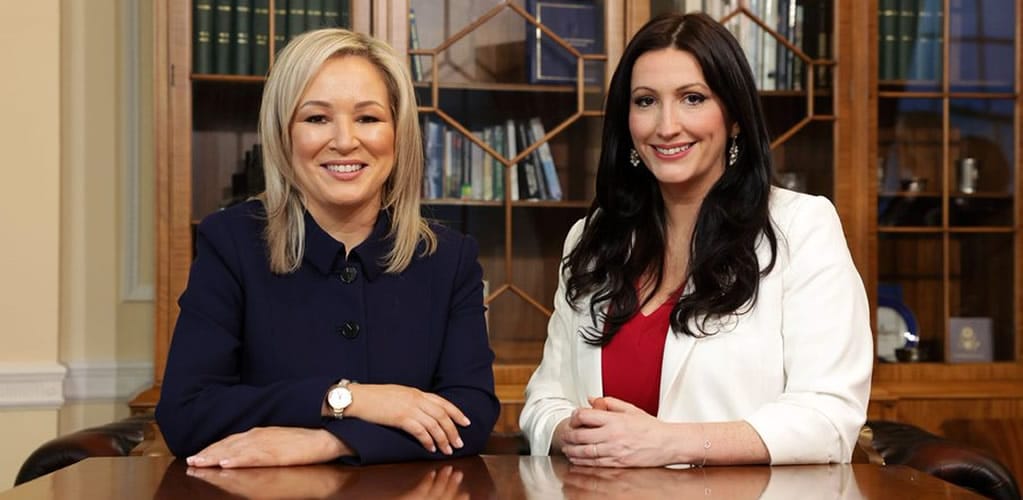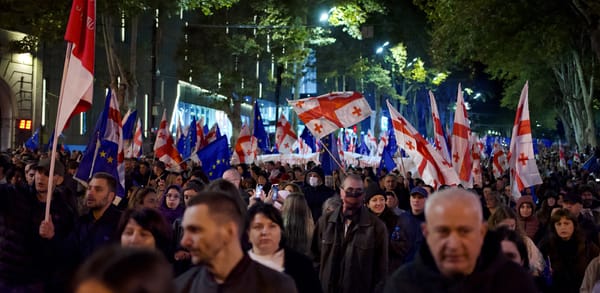A Northern Ireland photo powerfully represents a hazy concept: Peace
Michelle O’Neill and Emma Little-Pengelly, political rivals in Northern Ireland, exemplify unity for a shared political goal despite ideological differences. Their collaboration marks a positive step towards peace and cooperation.

Michelle O’Neill and Emma Little-Pengelly, political rivals in Northern Ireland, exemplify unity for a shared political goal despite ideological differences. Their collaboration marks a positive step towards peace and cooperation.
T wo women pose side by side.
Friends?
Family?
Bitter political rivals actually. But united in a political venture for their people.
That photo of Michelle O’Neill and Emma Little-Pengelly, respectively first minister and deputy first minister of Northern Ireland, is probably one of the most powerful representations of a hazy concept: peace. The absence of armed conflict. The gap left by murderous attempts to top the ‘other’. The time, money and attention that suddenly becomes available when two communities stop hitting at each other and decide to cooperate. The peace dividend has very real potential, and on February 3, one photo said it all.
Consider what had to happen before Ms O’Neill and Ms Little-Pengelly assumed their positions, side by side, for the cameras.
- Both sworn ideological enemies had to assume office in a power-sharing government.
- Both had to agree to the somewhat limiting possibilities of equal power, even though one would have the post of first minister, the other of deputy.
- Both had to agree that their profound political disagreements would not stand in the way of the essential business of governing.
In essence, the two women had to engage to safeguard the highest form of a democratic society, one that’s committed to the values of tolerance, cooperation, and compromise. They had to live what Mahatma Gandhi said: “Intolerance is itself a form of violence and an obstacle to the growth of a true democratic spirit.”
I am honoured to take office as First Minister.
— Michelle O’Neill (@moneillsf) February 3, 2024
I am committed to representing all our people and communities.
Let us work together to build a brighter, better future for everyone. pic.twitter.com/J6uM9msUd3
Some context in order to understand the remarkable nature of what happened in Northern Ireland on Saturday, February 3:
- Ms O’Neill is a republican or nationalist from Northern Ireland, which is to say she opposes the very basis on which the state of Northern Ireland exists and wants it to be united with the Irish Republic.
- Ms Little-Pengelly is a Northern Ireland unionist, who wants the status quo, i.e. its place within the United Kingdom, to persist in perpetuity.
- Though the republicans and unionists have been in a power-sharing government in Northern Ireland before, this is the first time an Irish republican has become chief executive of Northern Ireland in the 103 years since Ireland was partitioned and Northern Ireland was created.
In basic terms, what this means for Northern Ireland is very clear. The state once again has a devolved executive sitting in Belfast after a two-year hiatus.
But there is more. Northern Ireland was one of Europe’s longest-running political conflicts until the 26-year-old Good Friday peace agreement. But the peace project seemed to falter when the unionists rejected the distancing effects of Brexit on Northern Ireland’s trading relations with the United Kingdom and pulled the plug on the power-sharing devolved government.
That it’s back up and running is heartening. Two years to the day the plug was pulled, the two women took office and posed for that photo, side by side. Both made clear they understood the underlying tensions of going into an executive, power-sharing partnership. We can never agree politically, each said, in her remarks, but we can agree on the need for public services, health services and suchlike.
In other words, both understood they had to focus on improving Northern Ireland’s economy, public services and infrastructure.
Ms O’Neill has to demonstrate that the state her ideological brethren want to abolish as an entity can work for the people. Ms Little-Pengelly must show that Northern Ireland, as it now exists, is a successful state and there is no earthly need to separate from the UK and join Ireland.
"This is a day that people thought would never come and I am so proud to stand up today as First Minister and to represent the whole of society here. We are now in a new era, and this demonstrates the change that is happening across the whole island" – @moneillsf on #TWIP pic.twitter.com/KUFecv31GA
— Sinn Féin (@sinnfeinireland) February 4, 2024
Delighted to congratulate all our @duponline Ministers appointed today to serve the people of Northern Ireland in The Executive Office, Department of Education and Department for Communities. There is much to do and I wish @little_pengelly @paulgivan @gordonlyons1 &… pic.twitter.com/kxVDUZh3KL
— Jeffrey Donaldson MP (@J_Donaldson_MP) February 3, 2024
Across the ideological chasm, both must metaphorically link hands — tightly — and work to invest the peace dividend in their people’s wellbeing.
Can they do it? Will they do it? Who knows, but for now, this is a rare good news story about peace in a world red-dimmed by war.

GOING FURTHER
In Northern Ireland, ‘a Protestant state’ finally has a Catholic leader | Politico
Northern Ireland's funding is parties' number one priority, says O'Neill | BBC News
After a day of firsts in Northern Ireland, the work begins | RTE
Sources:
▪ This piece was first published in Medium and re-published in PMP Magazine on 4 February 2024 under a Creative Commons Attribution-NonCommercial 4.0 International licence. | The author writes in a personal capacity.
▪ Cover: X/Northern Ireland Executive. - First Minister, Michelle O’Neill and deputy First Minister, Emma Little-Pengelly. | 3 February 2024. (Licensed under a Creative Commons Attribution-ShareAlike 4.0 International License.)






[Read our Comments Guidelines]